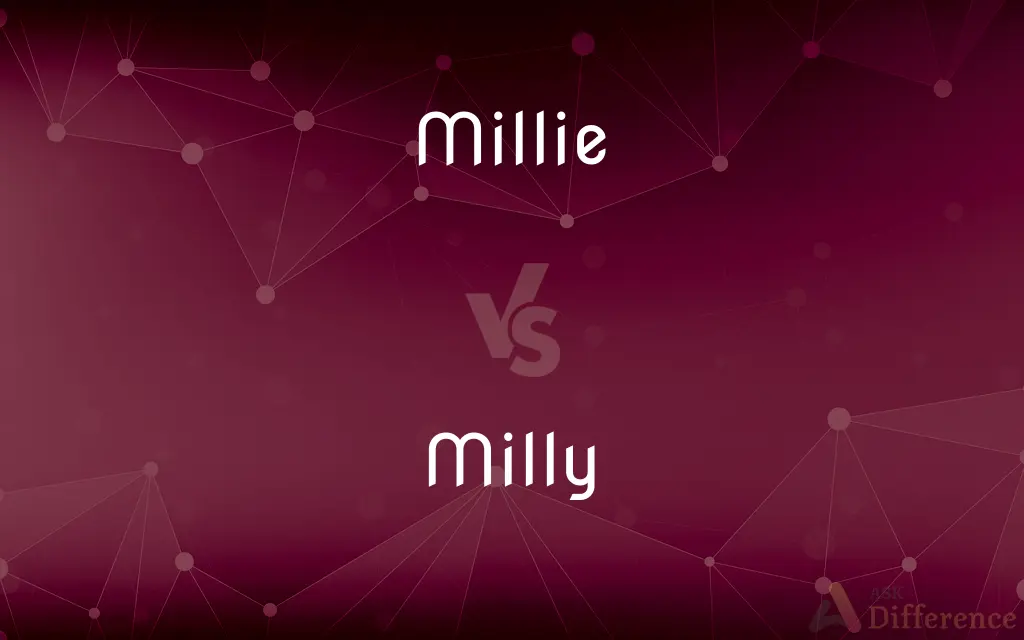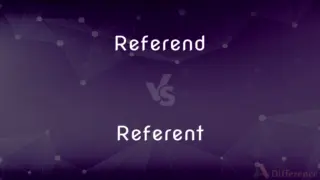Millie vs. Milly — What's the Difference?
Edited by Tayyaba Rehman — By Urooj Arif — Updated on March 10, 2024
Millie is a common diminutive of names like Mildred or Millicent, associated with strength and determination, while Milly, though often used interchangeably, can reflect a more modern or informal variation of the same names.

Difference Between Millie and Milly
Table of Contents
ADVERTISEMENT
Key Differences
Millie and Milly are diminutives for names such as Mildred, Millicent, and Emily, serving as affectionate or casual forms. The spelling difference between Millie and Milly is slight, but it can reflect regional or personal preferences. Millie, with its traditional "ie" ending, might be seen as a more classic or timeless choice. On the other hand, Milly, with a "y" ending, can be perceived as a fresher or more contemporary variation.
Millie has been used for centuries, rooted in names that convey strength and determination, like Mildred, which means "gentle strength," and Millicent, meaning "strong in work." The choice of Millie might reflect a nod to these traditional values and meanings. Conversely, Milly, while carrying the same historical significance, may appeal to those seeking a modern twist on a classic name, offering a sense of individuality and modernity.
In literature and popular culture, characters named Millie often embody qualities of resilience and depth, drawing from the rich heritage of the names from which Millie derives. Milly, by contrast, might be utilized for characters that bring a lighter, more whimsical touch to their narratives, showcasing versatility in both character development and storytelling.
The preference for Millie or Milly can also be influenced by familial traditions or the desire to honor a loved one. Some might choose Millie to maintain a connection to past generations, while others might opt for Milly to introduce a contemporary element into their family's naming tradition.
Despite these nuances, the choice between Millie and Milly often comes down to personal or aesthetic preference. Both versions retain the endearing and friendly connotations associated with their origin names, making them popular choices for parents seeking a name that is both charming and meaningful.
ADVERTISEMENT
Comparison Chart
Origin
Diminutive of names like Mildred, Millicent, Emily
Same as Millie
Connotation
Classic, timeless charm
Modern, informal
Historical Significance
Rooted in strength and determination
Same historical significance, with a contemporary twist
Usage in Literature and Culture
Often embodies resilience and depth
Used for characters with a whimsical, lighter touch
Preference Influences
Traditional values, familial connections
Modernity, individuality
Compare with Definitions
Millie
A diminutive form of names like Mildred and Millicent, symbolizing strength.
Millie's name was chosen for its meaning of gentle strength.
Milly
A modern variation of names like Millicent and Mildred.
Milly's parents wanted a name that was both modern and had historical depth.
Millie
Often used to denote a timeless and classic charm.
Millie's vintage style perfectly matched the timeless nature of her name.
Milly
Can indicate a preference for contemporary naming styles.
Milly stood out in her class with a name that was both unique and stylish.
Millie
Reflects a connection to historical values and depth.
Named Millie after her grandmother, she carried a sense of history and resilience.
Milly
Reflects a lighter, perhaps more whimsical character attribute.
Milly's playful personality was mirrored in the modern twist of her name.
Millie
Represents a choice for those appreciating traditional nuances.
Choosing the name Millie, they honored their family's heritage.
Milly
Chosen for its blend of individuality and historical significance.
Milly's name struck a perfect balance between honoring the past and embracing modernity.
Millie
Popular in various cultures for its affectionate tone.
Millie was a common nickname in her family, passed down through generations.
Milly
Signifies a break from tradition while maintaining a link to the past.
By naming her daughter Milly, she connected with her roots in a fresh way.
Millie
Millie is a feminine given name or diminutive form of various other given names, such as Emily, Millicent, Mildred, Camilla or sometimes Amelia.
Milly
Milly is a feminine given name, sometimes used as a short form (hypocorism) of Mildred, Amelia, Emily, etc.
Millie
A mill worker, usually a young working-class woman working in the factories of Ireland's linen industry.
Millie
A harshly-spoken working-class woman, often unemployed.
Common Curiosities
Can the choice between Millie and Milly reflect cultural differences?
Yes, the choice might reflect regional naming preferences, cultural influences, or family traditions.
Is there a significant difference between Millie and Milly?
The primary difference lies in spelling and personal preference, with Millie suggesting a classic feel and Milly a more modern touch.
Which version is more popular, Millie or Milly?
Popularity can vary by region and over time; historically, Millie has been more common, but trends can shift.
Do Millie and Milly have different meanings?
Both carry the same underlying meanings from their origin names, reflecting strength, work, and sometimes gentleness.
Can Millie and Milly be used for the same names?
Yes, both diminutives can be used interchangeably for names like Mildred, Millicent, and Emily.
Is one spelling more traditional than the other?
Millie is often viewed as the more traditional spelling, while Milly offers a contemporary variant.
How do personal preferences play into the choice between Millie and Milly?
Personal taste, family names, and the desired connotation can significantly influence the choice.
Can the choice of spelling influence the perception of a character or person?
Potentially, as Millie might evoke a sense of timelessness, whereas Milly could be perceived as more modern or unique.
Are there specific regions where Milly is more common than Millie?
Naming trends can vary, with Milly possibly being more favored in areas or cultures valuing modernized names.
Has the popularity of Millie and Milly changed over time?
Yes, the popularity of names tends to fluctuate over decades, influenced by cultural trends, famous personalities, and generational shifts.
Share Your Discovery

Previous Comparison
Necrosis vs. Autolysis
Next Comparison
Referend vs. ReferentAuthor Spotlight
Written by
Urooj ArifUrooj is a skilled content writer at Ask Difference, known for her exceptional ability to simplify complex topics into engaging and informative content. With a passion for research and a flair for clear, concise writing, she consistently delivers articles that resonate with our diverse audience.
Edited by
Tayyaba RehmanTayyaba Rehman is a distinguished writer, currently serving as a primary contributor to askdifference.com. As a researcher in semantics and etymology, Tayyaba's passion for the complexity of languages and their distinctions has found a perfect home on the platform. Tayyaba delves into the intricacies of language, distinguishing between commonly confused words and phrases, thereby providing clarity for readers worldwide.















































